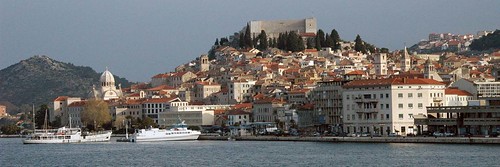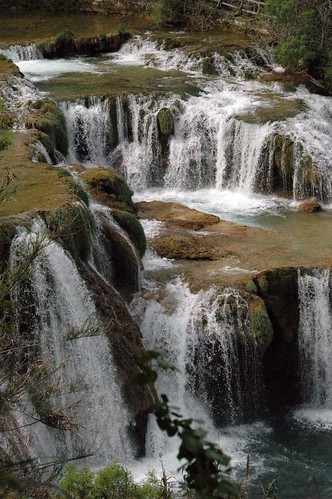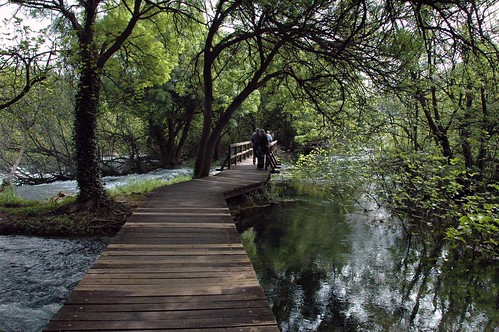Saturday, April 18, 2009
We arrive in Sibenik and depart immediately by bus for Skradin where we are to board a boat that will take us to the Krka National Park and the Krka River waterfalls.
Skradin is there, but no boat. That gives us a bit of time to walk about. It is a neat little town that feels as if it could fit into the palm of a large hand. Some of us go into the town square. It is immaculate and very simple. Three facades, one red, one yellow, one ochre, face onto what appears to be an ancient well in the center of the square. There is time enough for coffee while we find out what happened to the boat. One of the coffee drinkers, John McLellan, tells me this story. In the coffee shop he asked the proprietress if the war had come to Skradin. He had asked because the town was so picture perfect. Like Dubrovnik, it hardly seemed possible. The woman answered by bursting into tears. She managed to blurt out that her husband and brother were shot dead while she stood next to them. That, she said, was fifteen years ago. She will, of course, never forget.
John’s encounter was important. Behind all the conviviality and Riviera-esque sophistication of Split, the simply neatness and squared-off beauty of Skradin, the bustle of Split, the picture postcard-ness of Dubrovnik, there is the ugly mask of war. The contrast with Albanian won’t go away. One nation faces its past and its present is dreary. One nation has tried (unsuccessfully, I think) to bury its past and its present behind a façade. I wonder if the mask will crack. There are nations like South Africa that face their past with truth commissions. There are nations like Croatia that don’t. And where do we fit in? No truth commissions, but neither has the ignominy of Vietnam and Iraq been buried behind an unbroken façade. Which is the best path to national health? Time will tell.
It seems as if the boat left without us. We have a change in plans. Instead of boating to the bottom of the falls and walking up, we bus to the top and walk down. To my way of thinking that is not just a change. It is a vast improvement. The boat will take us back to the bus and the bus to the ship.
John McLellan has done me another service. As we navigate the boardwalk that crisscrosses the falls following its descent to the place where the river re-emerges, I am fixated not on what I’m walking through, but where I’m going. That I am actually walking through a waterfall is lost on me.
“Isn’t this incredible,” says John coming up behind me.
I snap out of it.
“Look at this,” he says pointing to a quiet pool of water at our feet surrounded by green leaves and brown branches.
I look at where he is pointing.
“Now look at that,” he says pointing a few feet beyond. The waterfall is rushing at maximum velocity down the mountainside to the Krka River below.
“They’re just feet apart,” he says, gurgling with the same enthusiasm that the waterfall has brought to the mountainside. “Look at the contrast. It is unbelievable.”
Before I can answer he has shot ahead of me and disappeared around the next bend of the boardwalk. He has stopped me in my tracks. I look around me for the first time. John is right. The contrasts are like no other I’ve seen. Quiet rivulets next to coursing waterways. Whoever set out this meander through the falls realized what a gem he or she had in hand and made the most of it.
Once we are back on board, The Island Sky embarks for Venice, our final port of call. That afternoon Paul Harris talks about the Balkans in peace and war. He makes a comment that I find intriguing. He says that at the outbreak of World War II Hitler was successful in creating an Albanian SS troop in Kosovo while a similar attempt in Albania proper failed. Why should this be so? Why were the Albanians in Kosovo susceptible to nazification while those in Albania not?
Auron Tare, an Albanian, and one of the founders of Butrint National Park and for several years was its director, told me that to understand what happened in Kosovo, you need to know that Germany was instrumental in freeing the Albanians from Serbian persecution. The Austro-Hungarian Empire had supported the Albanians in their conflict with the Slavs. Germany had continued those policies when the Austro-Hungarian Empire crumbled. The pro-German factions in Kosovo were drawn largely from the Albanian aristocracy, who associated Serbs with Communism and Communism with Russia, the historical enemy of the Albanians.
Mr. Tare noted that the SS Skanderbeg Division did not fight for the Germans. Rather—and Mr. Tare’s source for this next statement is the memoir of the German Army Commander of the SS Skanderbeg Division—the Albanians joined the division so that they might acquire arms to use against the Serbs when the latter moved to retake Kosovo for themselves. In his words, “all the recruits left as soon as they got weapons.”
There were other Albanian political factions in Kosovo that supported the Germans. Many of these ended up as immigrants to America where, because of their anti-Communist stance, they were welcomed with open arms. As the fortune cookie says, “The enemy of my enemy is my friend.”




